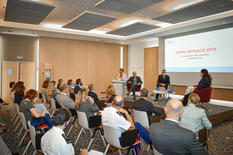Youth addiction conference held following publication of ESPAD report
Monaco Statistics held a conference on psychoactive substance consumption patterns and non-substance addiction (addiction to the internet, social media, betting) among the Principality’s teenagers at the Novotel Monte-Carlo on Wednesday 23 September 2020.
The conference followed the survey carried out among pupils at the Principality’s upper secondary schools by Monaco Statistics in April 2019 as part of the European School Survey Project on Alcohol and Other Drugs (ESPAD). The Principality has taken part in ESPAD since 2007.
The aim of the conference was to report the results of the survey and the trends observed, and also to offer a professional assessment of these phenomena through presentations by experts on youth addiction. The following speakers gave an insight into the risks of such practices among young people, particularly in relation to tobacco, alcohol and cannabis: Dr Valérie Aubin, psychiatrist and Head of the Psychiatry Service at Princess Grace Hospital, Dr Jean-François Goldbroch, psychiatrist, addiction specialist and Deputy Head of the Psychiatry Service at Princess Grace Hospital, and Stanislas Spilka, Head of the DATA Unit at the French Monitoring Centre for Drugs and Drug Addiction (OFDT) and ESPAD lead scientist for Monaco and France in relations with European organisations.
Minister of the Interior Patrice Cellario reminded participants of the measures that have been introduced in the Principality to prevent and combat addiction, and reiterated the value of this survey and the figures that it provides in helping his teams to take action.
Finally, Minister of Health and Social Affairs Didier Gamerdinger presented the broad outlines of the draft mental health plan, which will put in place specific actions relating to addiction information, prevention and treatment.
The report published and presented by Monaco Statistics shows firstly that, overall, use of the three main substances consumed (alcohol, tobacco and cannabis) fell between 2007 and 2019. This was particularly the case for tobacco, and held true across all patterns of consumption (experimentation, recent use and regular consumption).
The results of the ESPAD Monaco 2019 survey also highlight that:
- In 2019, 93% of upper secondary school pupils had already experimented with at least one of alcohol, tobacco or cannabis.
- Alcohol is by far the most frequently consumed product: nine out of ten pupils had already tried it, and a large majority of them had consumed alcohol within the past year or month. It is considered to be the most accessible substance, and is available early, sometimes from primary level. Alcohol is regularly consumed (more than 10 times during a month) by 10% of pupils.
- The use of tobacco, which is more common among girls, is falling. However, more than half of pupils said that they had already smoked one cigarette in their lives, and 13% smoked on a daily basis.
- The use of e-cigarettes has soared: the 2019 survey results showed a substantial increase in experimentation with e-cigarettes and their use by pupils during the previous 12 months.
- More than a third of teenagers had experimented with cannabis, and 5% used it regularly. Occasional use is on a downward trend, while regular use remains stable. Analysis of behaviour around consumption of this substance also highlighted that with 19% of pupils having consumed cannabis during the previous 12 months, there could be an elevated risk of problematic usage or even dependence on this substance. Cannabis use is more common among boys.
With regard to non-substance addictions, the internet and social media are now an integral part of daily life for upper secondary pupils. Use of the internet increased more than any other activity over the period 2007–2019. The majority of pupils spend several hours every day on social media, and this increases at weekends and during holidays.
Gambling has not exploded to the same extent, but betting is an activity that should be monitored, particularly sports betting. This should be subject to close monitoring given the known risks presented by gambling.
In conclusion, the work carried out by Monaco Statistics shows that overall, there has been a reduction in the consumption of alcohol, tobacco and cannabis by upper secondary school pupils in the Principality, illustrating a positive trend in the use of these three main substances.
Nonetheless, as was reiterated during the course of the discussions, this trend must not obscure the fact that there has been an increase in other practices, nor the dangers that continue to be associated with these addictive behaviours during adolescence, a period of physical, physiological and psychological development which makes young people vulnerable to developing risky behaviours.
The aim of monitoring all of these indicators, some of which have been observed over a long period, is to provide a public health management tool, and to offer health care professionals, teachers and parents a clear and objective picture of the consumption of psychoactive substances and non-substance addiction among teenagers in the Principality.
In addition to the scientific and statistical work involved in conducting this survey and analysing the results, Monaco Statistics hopes to provide stakeholders with the right information and to enable them to better understand the mechanisms of addiction in order to strengthen the implementation of effective addiction information and prevention measures.
The detailed report is available from www.imsee.mc
Autres actualités du thème

E-scooters and e-bikes: harmonised regulations to better protect young users

Youth workshops and courses (3 -18 years old) - Exhibition – 'Demain l’Océan?’ - Quai Antoine I Exhibition Hall – Monaco

Outstanding results for the Principality’s school pupils and students in the end-of-year exams








